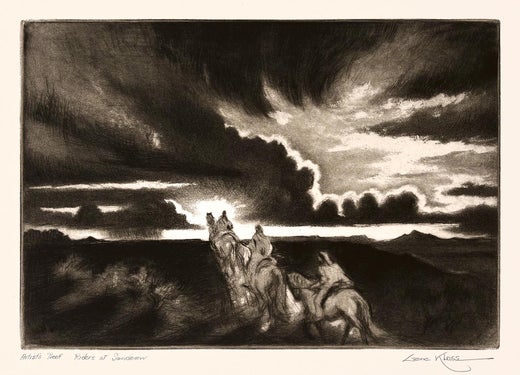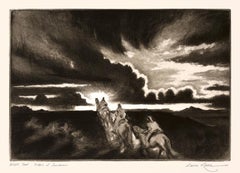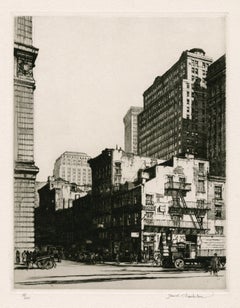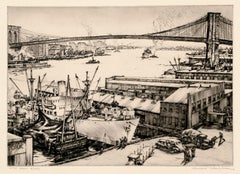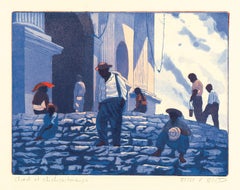Want more images or videos?
Request additional images or videos from the seller
1 of 3
Gene KlossProcessional - Taos1948
1948
Price:$2,560
About the Item
- Creator:Gene Kloss (1903-1996, American)
- Creation Year:1948
- Dimensions:Height: 9.88 in (25.1 cm)Width: 13.94 in (35.41 cm)
- Medium:
- Movement & Style:
- Period:
- Condition:
- Gallery Location:Myrtle Beach, SC
- Reference Number:Seller: 1031151stDibs: LU53233945222
Gene Kloss
Gene (Alice Geneva) Kloss is considered one of America’s master printmakers. She was born in Oakland, California and established herself as an artist on the West coast. Kloss was introduced to etching by Perham Nahl while at UC Berkley. She graduated in 1924, and in 1925 married poet Phillips Kloss. In her late twenties, Kloss moved to Taos, New Mexico and began her life’s work of the New Mexican landscape and peoples. It was at this time that she received national acclaim. Her artwork exudes an unmistakable content and style. Enchanted by the architecture, mountainous landscapes and rituals of the inhabitants, Kloss captured the beauty of the Southwest and surrounding areas. Her style was bold yet deftly simple, masterfully expressing the elusive Southwestern light. In 1938, she exhibited in Paris with Ernest Blumenschein, Georgia O’Keeffe, and John Sloan. She was also a member of the National Academy of Design, New York.
About the Seller
5.0
Recognized Seller
These prestigious sellers are industry leaders and represent the highest echelon for item quality and design.
Platinum Seller
Premium sellers with a 4.7+ rating and 24-hour response times
Established in 1995
1stDibs seller since 2016
334 sales on 1stDibs
Typical response time: 1 hour
Associations
International Fine Print Dealers Association
Authenticity Guarantee
In the unlikely event there’s an issue with an item’s authenticity, contact us within 1 year for a full refund. DetailsMoney-Back Guarantee
If your item is not as described, is damaged in transit, or does not arrive, contact us within 7 days for a full refund. Details24-Hour Cancellation
You have a 24-hour grace period in which to reconsider your purchase, with no questions asked.Vetted Professional Sellers
Our world-class sellers must adhere to strict standards for service and quality, maintaining the integrity of our listings.Price-Match Guarantee
If you find that a seller listed the same item for a lower price elsewhere, we’ll match it.Trusted Global Delivery
Our best-in-class carrier network provides specialized shipping options worldwide, including custom delivery.You May Also Like
Irving Guyer, Christmas Trees on Second Street (NYC)
By Irving Guyer
Located in New York, NY
Philadelphia-born Irving Guyer attended the Art Students League and worked in New York City before moving to California. This print is signed and titled i...
Category
1930s American Modern Figurative Prints
Materials
Drypoint, Etching
The Enchanted Doorway; Venezia
By John Taylor Arms
Located in Middletown, NY
Etching and drypoint on antique cream laid paper, 12 3/8 x 6 9/16 inches (315 x 167 mm), full margins. Signed, dated, and inscribed "Edition 100" in pencil, lower margin. In very goo...
Category
Early 20th Century American Modern Landscape Prints
Materials
Handmade Paper, Etching, Drypoint
Street in Marblehead, Massachussets
By Lawrence Wilbur
Located in Middletown, NY
Drypoint etching on white, buff laid paper with deckle edges, 8 13/16 x 12 inches (224 x 305 mm), full margins. One of only 25 proof impressions. In superb condition with excellent i...
Category
1930s American Modern Landscape Prints
Materials
Archival Paper, Drypoint, Etching
Cherry Street
By Charles Frederick William Mielatz
Located in Middletown, NY
A view of lower Manhattan's Cherry Street as it appeared at the turn of the 20th century. One of only 5 proof impressions.
New York: 1904.
Drypoint with aquatint on watermarked, cr...
Category
Early 20th Century American Modern Landscape Prints
Materials
Handmade Paper, Drypoint, Etching
Guardians of the Spire; Amiens Cathedral Number 2
By John Taylor Arms
Located in Middletown, NY
Guardians of the Spire; Amiens Cathedral Number 2
New York: 1937. Etching and drypoint on watermarked F.J. Head cream-colored, antique laid paper, 6 3/4 ...
Category
Mid-20th Century American Modern Figurative Prints
Materials
Drypoint, Etching
Tugs on the Hudson
By Charles Frederick William Mielatz
Located in Middletown, NY
Drypoint etching with engraving printed in black ink on Japanese mulberry paper, 4 1/2 x 3 3/8 inches (113 x 84 mm), full margins. In superb condition. A beautiful New York City river...
Category
Early 20th Century American Modern Landscape Prints
Materials
Handmade Paper, Drypoint, Etching
Cortland Street
Located in Middletown, NY
Etching with drypoint on antique handmade laid Japon paper, 12 7/8 x 7 1/2 (327 x 191 mm); sheet 15 5/16 x 10 7/16 (389 x 265 mm), full margins. Signed in pencil in the lower margin....
Category
Early 20th Century American Modern Landscape Prints
Materials
Drypoint, Etching
Rainy Day, Providence
Located in Middletown, NY
Etching with drypoint on Japan paper, 9 3/4 x 12 3/4 inches (245 x 322 mm), full margins, from an edition of approximately 50. Signed by the artist in pencil, lower center margin, t...
Category
Early 20th Century American Modern Landscape Prints
Materials
Handmade Paper, Drypoint, Etching
Low Country (South Carolina)
By Elizabeth Verner
Located in Middletown, NY
An enchanting Southern landscape by the mother of the Charleston Renaissance, Elizabeth O'Neill Verner(1883-1979)
Etching and drypoint on cream wove paper, 6 15/16 x 5 1/16 inches (175 x 128 mm), full margins. Signed, titled and numbered 72/100 in pencil, lower margin. Uniform age tone, minor surface soiling. A rich and inky impression of a magical southern landscape with figure tilling soil under Spanish moss covered oaks.
A native of Charleston, South Carolina...
Category
1930s American Modern Landscape Prints
Materials
Drypoint, Etching
Chicago Skyline
By Paul Schumann
Located in Middletown, NY
A beautiful turn-of-the-century lake view of Chicago by an American artist known for his Texas landscapes.
Etching with drypoint on watermarked Umbria laid paper with deckle edges, 7 1/4 x 10 7/8 inches (182 x 275 mm), full margins. Signed and numbered 4/25 in pencil, lower margin. In good condition with adhesive residue at the sheet edges on the verso, does not show through to the recto. A lovely Lake Michigan landscape...
Category
Early 20th Century American Modern Landscape Prints
Materials
Handmade Paper, Etching, Drypoint
More From This Seller
View All'Riders at Sundown' — Mid-Century Southwest Regionalism
By Gene Kloss
Located in Myrtle Beach, SC
'Riders at Sundown', aquatint and drypoint, edition 75, 1953, Kloss 451. Signed, titled, and annotated 'Artist's Proof' in pencil. A superb, richly-inked, atmospheric impression, in ...
Category
1950s American Modern Landscape Prints
Materials
Drypoint, Aquatint
'Manhattan Old and New' — Vintage New York Cityscape
By Samuel Chamberlain
Located in Myrtle Beach, SC
Samuel Chamberlain, 'Manhattan Old and New', drypoint, 1929, edition 100, Chamberlain and Kingsland 81. Signed, titled, and numbered '81/100' in pencil. Titled and annotated '30.00' in pencil, in the artist's hand, bottom margin. Matted to museum standards, unframed.
A superb, finely-detailed impression, with selectively wiped plate tone, on heavy Rives cream wove paper; full margins (1 1/2 to 2 1/4 inches), in excellent condition.
The subject of the print is the lower Manhattan cityscape just before the Depression.
Image size 8 3/4 x 6 13/16 inches (222 x 173 mm); sheet size 12 3/4 x 10 inches (324 x 254 mm).
Impressions of this work are held in the collections of the National Gallery of Art and the Zimmerli Art Museum.
ABOUT THE ARTIST
'There is something about the atmospheric vibrancy of an etching which imparts a peculiar and irresistible life to architectural drawing...A copper plate offers receptive ground to the meticulously detailed drawing which so often appeals to the architect'. —Samuel Chamberlain, from the Catalogue Raisonné of his prints.
Samuel V. Chamberlain (1896 - 1975), printmaker, photographer, author, and teacher, was born in Iowa. His family moved to Aberdeen, Washington in 1901, and in 1913, Chamberlain enrolled in the University of Washington in Seattle, where he studied architecture under Carl Gould. By 1915, he was enrolled in the School of Architecture of the Massachusetts Institute of Technology in Boston. With the United States' involvement in the First World War, Chamberlain sailed to France, where he volunteered in the American Field Service. In 1918, he was transferred to the United States Army to complete his tour of duty. After the war, he returned to Boston and resumed his architectural studies, which he eventually discontinued, working for a few years as a commercial artist.
Chamberlain received the American Field Service Scholarship in 1923, which he used to travel to Spain, North Africa, and Italy. In 1924 he was living in Paris, where he studied lithography with Gaston Dorfinant and etching and drypoint with Edouard Léon, publishing his first etching the following year. In 1927, he studied drypoint with Malcolm Osborne...
Category
1920s American Modern Landscape Prints
Materials
Drypoint
'The East River', Brooklyn Bridge — Mid-Century Realism, New York City
By Lawrence Wilbur
Located in Myrtle Beach, SC
Lawrence Nelson Wilbur (1897-1988), 'The East River', drypoint, edition 65, 1946. Signed, titled, and annotated 'A. Jones Proof 1946' in pencil. Signed and dated in the plate, lower ...
Category
1940s American Modern Landscape Prints
Materials
Drypoint
Church at Chichicastenango
By Jesse F. Reed
Located in Myrtle Beach, SC
Jesse F. Reed, 'Church at Chichicastenango', color etching and aquatint, 1963. Signed and titled in pencil. Signed and dated in the plate, lower right. A fine, richly-inked impression, with fresh colors, on cream wove paper; the full sheet with margins (1 3/8 to 2 1/2 inches), in excellent condition.
Chichicastenango, also known as Santo Tomás Chichicastenango, is a town in the El Quiché department of Guatemala, located in a mountainous region about 140 km northwest of Guatemala City. Chichicastenango is a K'iche' Maya cultural center, with the great majority of the municipality's population indigenous Mayan K'iche. The church depicted is the 400-year-old church Iglesia de Santo Tomás. Built atop a Pre-Columbian temple platform, the steps which remain venerated today, originally led to a temple of the pre-Hispanic Maya civilization. K'iche' Maya priests still use the church for their rituals, burning incense and candles. Each of the 18 stairs that lead up to the church stands for one month of the Maya calendar year.
ABOUT THE ARTIST
Jesse Floyd Reed (1920-2011) studied art in New York City at the Grand Central School of Art and the Art Students’ League. He held degrees in History and English and completed special advance studies in Asian, African, and Latin American art, history and culture. At the time of his retirement, he was a Professor of the Arts Emeritus at Davis & Elkins College, a position he held for over forty-nine years.
A nationally recognized artist since 1947, Professor Reed’s art has been shown in hundreds of museums, libraries, colleges, and universities, including the Boston Museum, National Museum, The Library of Congress, Brooklyn Museum, and Seattle Museum. In his native West Virginia, he is represented in the permanent collections of the Huntington Museum and the Charleston Museum at Sunrise.
The recipient of many national and regional awards, Reed was a member of the Salmagundi Club in NY, the Boston Printmakers, the Print Club of Albany, and was a founding member of the West Virginia Water...
Category
1960s American Modern Landscape Prints
Materials
Etching, Aquatint
'St. Marks on the Bowery' - Famed New York City Landmark
By Leon Dolice
Located in Myrtle Beach, SC
'St. Mark's Church on the Bowery', aquatint with etching, edition not stated but small, 1932. Signed in pencil. Signed in the plate lower left and titled in the plate lower right. A superb, atmospheric impression, on cream wove paper, with full margins (1 1/8 to 2 inches), in excellent condition. Matted to museum standards, unframed.
Image size 9 3/4 x 7 3/8 inches (248 x 187 mm); sheet size 13 1/8 x 10 inches (333 x 254 mm).
Impressions of this work are held in the collections of the Princeton University Art Museum and the Five College Museums.
ABOUT THE ARTIST
Born in Vienna, Leon Dolice left a secure position in the family business to pursue his artistic interests. He began his art education in his teens and early twenties when he traveled through Europe to study the works of the Old Masters. He immigrated to America in 1920 and made his home in Manhattan. As a printmaker, he chose as his subjects the architecture, back streets, dock scenes, and other aspects of New York City life that were being overtaken by the modern world.
In 1950, learning of the coming demolition of the Third Avenue El, Dolice created a series of Third Avenue and other New York City landmarks that were threatened with extinction. His images from that period provide a record of a New York that has passed into history.
During his lifetime, Dolice exhibited throughout Europe and the United States. Retrospectives of his work include a one-man show of his graphic work at Tribeca Gallery, New York; the traveling exhibition ‘Vintage New York’ with the New Rochelle Council on the Arts; and the Hofstra Museum, Hempstead.
Dolice's works are in the permanent collections of the Museum of the City of New York, the National Gallery of Art, the New York Historical Society, Georgetown University, the Philadelphia Print Club, and the New York Public Library, as well as private and corporate collections.
ABOUT ST. MARKS CHURCH
St. Mark's Church in-the-Bowery is a parish of the Episcopal Church located at 131 East 10th Street, at the intersection of Stuyvesant Street and Second Avenue in the East Village neighborhood of Manhattan in New York City. The property has been the site of continuous Christian worship since the mid-17th century, making it New York City's oldest site of continuous religious practice. The structure is the second-oldest church building in Manhattan.
In 1651, Petrus Stuyvesant, Director General of New Netherland, purchased land for a bowery or farm from the Dutch West India Company and, by 1660, built a family chapel at the present-day site of St. Mark's Church. Stuyvesant died in 1672 and was interred in a vault under the chapel.
Stuyvesant's great-grandson, Petrus "Peter" Stuyvesant, sold the chapel property to the Episcopal Church for $1 in 1793, stipulating that a new chapel be erected to serve Bowery Village, the community which had coalesced around the Stuyvesant family chapel. In 1795, the cornerstone of the present-day St. Mark's Church was laid, and the fieldstone Georgian-style church, built by the architect and mason John McComb Jr., was completed and consecrated on May 9, 1799.[4] Alexander Hamilton provided legal aid in incorporating St. Mark's Church as the first Episcopal parish independent of Trinity Church in New York City. By 1807, the church had as many as two hundred worshipers at its summer services, with 70 during the winter.
While the 19th century saw St. Mark's Church grow through its many construction projects, the 20th century was marked by community service and cultural expansion. Today, the rectory houses the Neighborhood Preservation Center, the Greenwich Village Society for Historic Preservation, and the Historic Districts Council, as well as other preservation and community organizations such as the Poetry Project, the Millennium Film Workshop, and the Danspace Project.
St Mark's has supported an active artistic community since the 19th century. In 1919, poet Kahlil Gibran was appointed a member of the St. Mark's Arts Committee, and the next year, the two prominent Indian statues, "Aspiration" and "Inspiration" by sculptor Solon Borglum...
Category
1930s American Modern Landscape Prints
Materials
Etching, Aquatint
'Brooklyn Bridge' — Iconic New York City Landmark
By Luigi Kasimir
Located in Myrtle Beach, SC
Luigi Kasimir, 'Brooklyn Bridge', color etching with aquatint, 1927, edition 100. Signed in pencil.
A superb impression, with fresh colors, on heavy, cream wove paper; with margins...
Category
1920s American Modern Landscape Prints
Materials
Etching, Aquatint
